Stakeholder Theory and Adani Coal Mine Operations in Queensland
VerifiedAdded on 2022/11/10
|12
|2414
|288
Report
AI Summary
This report provides a comprehensive analysis of the Adani coal mining operations in Queensland, focusing on the application of stakeholder theory. It begins with a general explanation of stakeholder theory, emphasizing the interconnected relationships between businesses and their stakeholders, including investors, suppliers, customers, and the community. The report then identifies and analyzes three key stakeholder groups affected by the Adani operations: the government, workers, and local communities, with a specific focus on the indigenous community. The impacts on each group – economic, environmental, and social – are thoroughly examined. The report further explores the ethical considerations in managing the interests of the indigenous community, highlighting the importance of cultural competency, trust, and integrity. Finally, it applies stakeholder theory to explain how the interests of the identified stakeholder groups have been and should be managed, emphasizing the need for ethical practices and sustainable development. The analysis concludes that the Adani Group can manage the stakeholder's interest by complying with the laws, ensuring workers safety and by working for the benefit of communities as a whole.
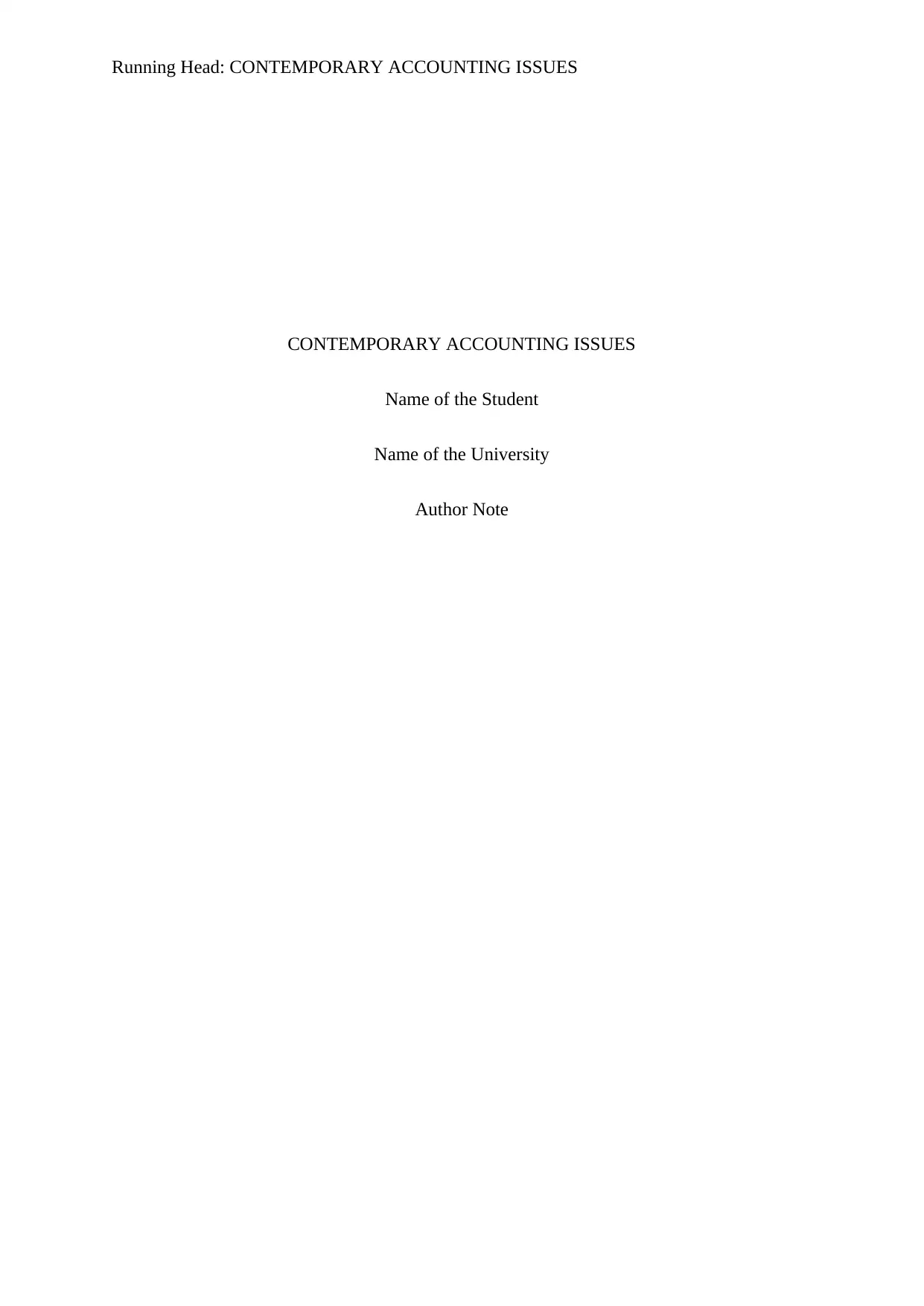
Running Head: CONTEMPORARY ACCOUNTING ISSUES
CONTEMPORARY ACCOUNTING ISSUES
Name of the Student
Name of the University
Author Note
CONTEMPORARY ACCOUNTING ISSUES
Name of the Student
Name of the University
Author Note
Paraphrase This Document
Need a fresh take? Get an instant paraphrase of this document with our AI Paraphraser
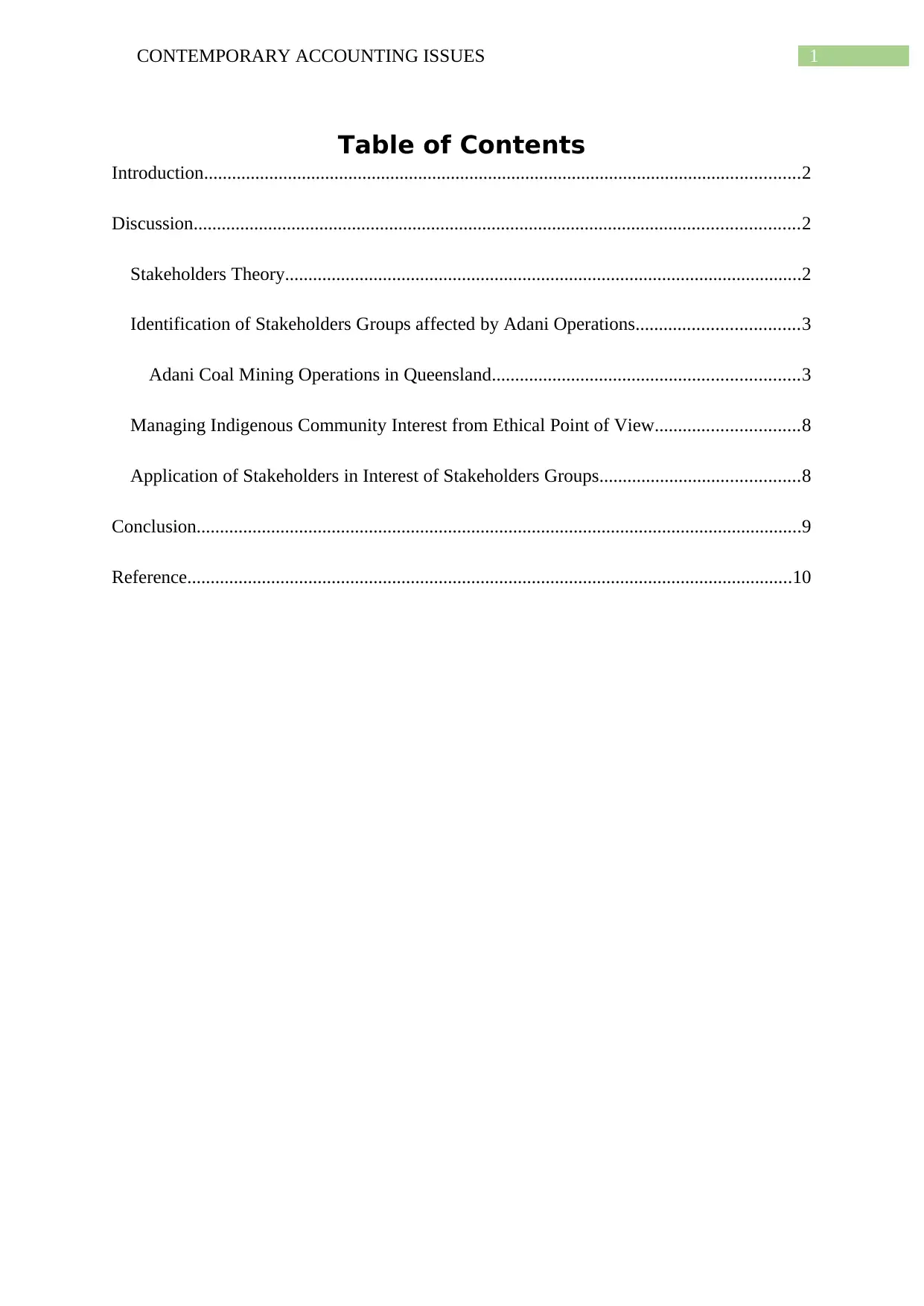
1CONTEMPORARY ACCOUNTING ISSUES
Table of Contents
Introduction................................................................................................................................2
Discussion..................................................................................................................................2
Stakeholders Theory...............................................................................................................2
Identification of Stakeholders Groups affected by Adani Operations...................................3
Adani Coal Mining Operations in Queensland..................................................................3
Managing Indigenous Community Interest from Ethical Point of View...............................8
Application of Stakeholders in Interest of Stakeholders Groups...........................................8
Conclusion..................................................................................................................................9
Reference..................................................................................................................................10
Table of Contents
Introduction................................................................................................................................2
Discussion..................................................................................................................................2
Stakeholders Theory...............................................................................................................2
Identification of Stakeholders Groups affected by Adani Operations...................................3
Adani Coal Mining Operations in Queensland..................................................................3
Managing Indigenous Community Interest from Ethical Point of View...............................8
Application of Stakeholders in Interest of Stakeholders Groups...........................................8
Conclusion..................................................................................................................................9
Reference..................................................................................................................................10
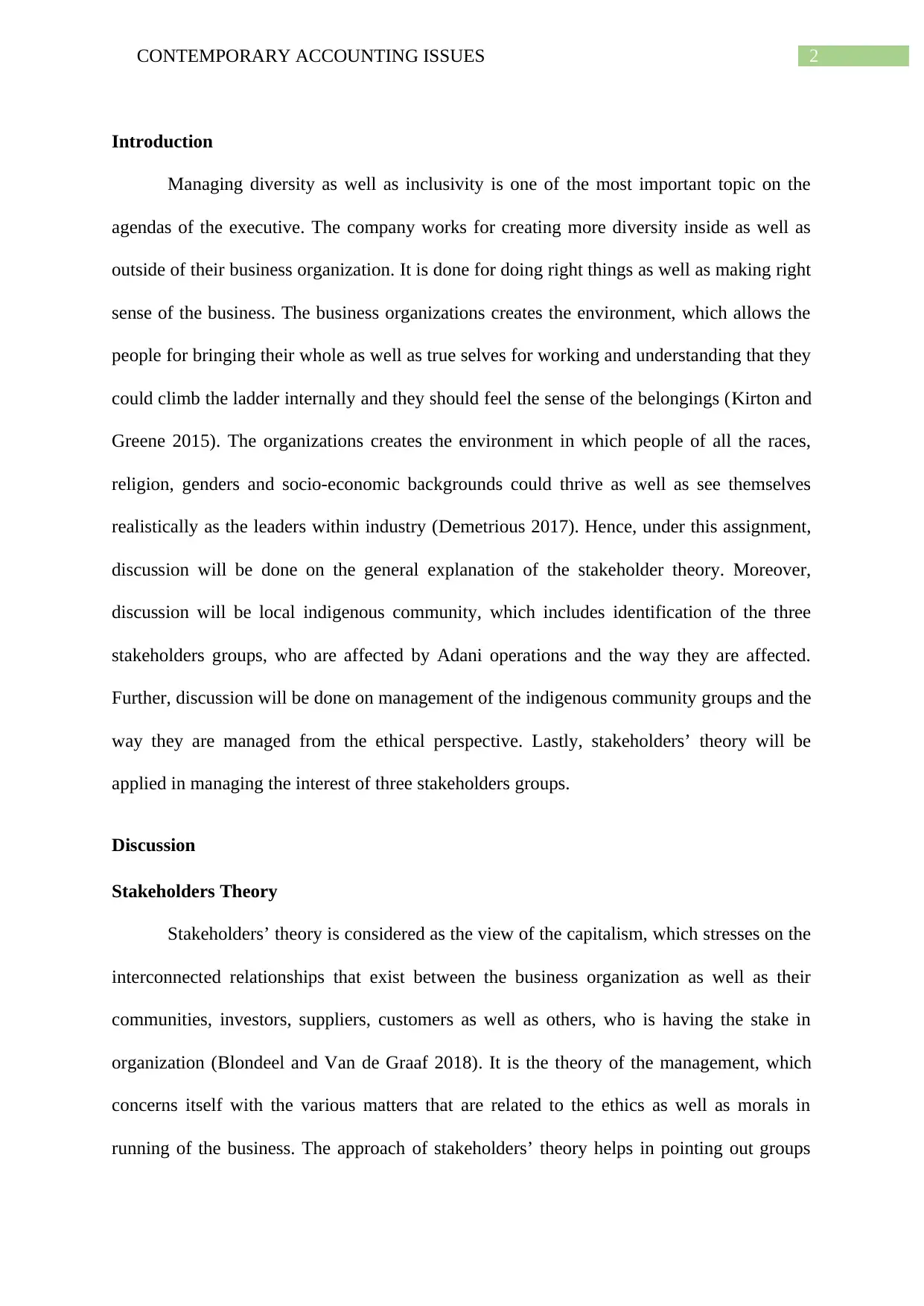
2CONTEMPORARY ACCOUNTING ISSUES
Introduction
Managing diversity as well as inclusivity is one of the most important topic on the
agendas of the executive. The company works for creating more diversity inside as well as
outside of their business organization. It is done for doing right things as well as making right
sense of the business. The business organizations creates the environment, which allows the
people for bringing their whole as well as true selves for working and understanding that they
could climb the ladder internally and they should feel the sense of the belongings (Kirton and
Greene 2015). The organizations creates the environment in which people of all the races,
religion, genders and socio-economic backgrounds could thrive as well as see themselves
realistically as the leaders within industry (Demetrious 2017). Hence, under this assignment,
discussion will be done on the general explanation of the stakeholder theory. Moreover,
discussion will be local indigenous community, which includes identification of the three
stakeholders groups, who are affected by Adani operations and the way they are affected.
Further, discussion will be done on management of the indigenous community groups and the
way they are managed from the ethical perspective. Lastly, stakeholders’ theory will be
applied in managing the interest of three stakeholders groups.
Discussion
Stakeholders Theory
Stakeholders’ theory is considered as the view of the capitalism, which stresses on the
interconnected relationships that exist between the business organization as well as their
communities, investors, suppliers, customers as well as others, who is having the stake in
organization (Blondeel and Van de Graaf 2018). It is the theory of the management, which
concerns itself with the various matters that are related to the ethics as well as morals in
running of the business. The approach of stakeholders’ theory helps in pointing out groups
Introduction
Managing diversity as well as inclusivity is one of the most important topic on the
agendas of the executive. The company works for creating more diversity inside as well as
outside of their business organization. It is done for doing right things as well as making right
sense of the business. The business organizations creates the environment, which allows the
people for bringing their whole as well as true selves for working and understanding that they
could climb the ladder internally and they should feel the sense of the belongings (Kirton and
Greene 2015). The organizations creates the environment in which people of all the races,
religion, genders and socio-economic backgrounds could thrive as well as see themselves
realistically as the leaders within industry (Demetrious 2017). Hence, under this assignment,
discussion will be done on the general explanation of the stakeholder theory. Moreover,
discussion will be local indigenous community, which includes identification of the three
stakeholders groups, who are affected by Adani operations and the way they are affected.
Further, discussion will be done on management of the indigenous community groups and the
way they are managed from the ethical perspective. Lastly, stakeholders’ theory will be
applied in managing the interest of three stakeholders groups.
Discussion
Stakeholders Theory
Stakeholders’ theory is considered as the view of the capitalism, which stresses on the
interconnected relationships that exist between the business organization as well as their
communities, investors, suppliers, customers as well as others, who is having the stake in
organization (Blondeel and Van de Graaf 2018). It is the theory of the management, which
concerns itself with the various matters that are related to the ethics as well as morals in
running of the business. The approach of stakeholders’ theory helps in pointing out groups
⊘ This is a preview!⊘
Do you want full access?
Subscribe today to unlock all pages.

Trusted by 1+ million students worldwide
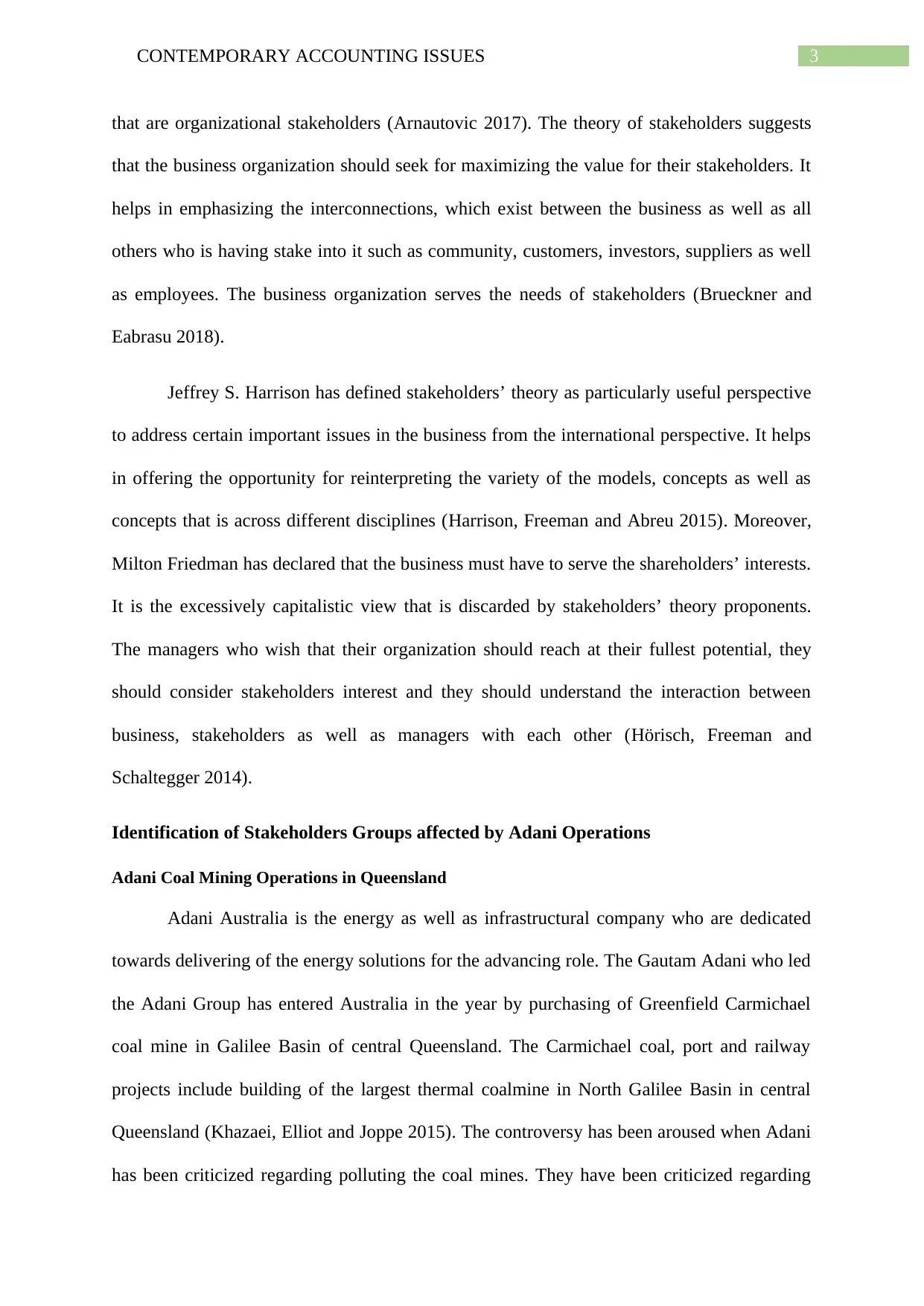
3CONTEMPORARY ACCOUNTING ISSUES
that are organizational stakeholders (Arnautovic 2017). The theory of stakeholders suggests
that the business organization should seek for maximizing the value for their stakeholders. It
helps in emphasizing the interconnections, which exist between the business as well as all
others who is having stake into it such as community, customers, investors, suppliers as well
as employees. The business organization serves the needs of stakeholders (Brueckner and
Eabrasu 2018).
Jeffrey S. Harrison has defined stakeholders’ theory as particularly useful perspective
to address certain important issues in the business from the international perspective. It helps
in offering the opportunity for reinterpreting the variety of the models, concepts as well as
concepts that is across different disciplines (Harrison, Freeman and Abreu 2015). Moreover,
Milton Friedman has declared that the business must have to serve the shareholders’ interests.
It is the excessively capitalistic view that is discarded by stakeholders’ theory proponents.
The managers who wish that their organization should reach at their fullest potential, they
should consider stakeholders interest and they should understand the interaction between
business, stakeholders as well as managers with each other (Hörisch, Freeman and
Schaltegger 2014).
Identification of Stakeholders Groups affected by Adani Operations
Adani Coal Mining Operations in Queensland
Adani Australia is the energy as well as infrastructural company who are dedicated
towards delivering of the energy solutions for the advancing role. The Gautam Adani who led
the Adani Group has entered Australia in the year by purchasing of Greenfield Carmichael
coal mine in Galilee Basin of central Queensland. The Carmichael coal, port and railway
projects include building of the largest thermal coalmine in North Galilee Basin in central
Queensland (Khazaei, Elliot and Joppe 2015). The controversy has been aroused when Adani
has been criticized regarding polluting the coal mines. They have been criticized regarding
that are organizational stakeholders (Arnautovic 2017). The theory of stakeholders suggests
that the business organization should seek for maximizing the value for their stakeholders. It
helps in emphasizing the interconnections, which exist between the business as well as all
others who is having stake into it such as community, customers, investors, suppliers as well
as employees. The business organization serves the needs of stakeholders (Brueckner and
Eabrasu 2018).
Jeffrey S. Harrison has defined stakeholders’ theory as particularly useful perspective
to address certain important issues in the business from the international perspective. It helps
in offering the opportunity for reinterpreting the variety of the models, concepts as well as
concepts that is across different disciplines (Harrison, Freeman and Abreu 2015). Moreover,
Milton Friedman has declared that the business must have to serve the shareholders’ interests.
It is the excessively capitalistic view that is discarded by stakeholders’ theory proponents.
The managers who wish that their organization should reach at their fullest potential, they
should consider stakeholders interest and they should understand the interaction between
business, stakeholders as well as managers with each other (Hörisch, Freeman and
Schaltegger 2014).
Identification of Stakeholders Groups affected by Adani Operations
Adani Coal Mining Operations in Queensland
Adani Australia is the energy as well as infrastructural company who are dedicated
towards delivering of the energy solutions for the advancing role. The Gautam Adani who led
the Adani Group has entered Australia in the year by purchasing of Greenfield Carmichael
coal mine in Galilee Basin of central Queensland. The Carmichael coal, port and railway
projects include building of the largest thermal coalmine in North Galilee Basin in central
Queensland (Khazaei, Elliot and Joppe 2015). The controversy has been aroused when Adani
has been criticized regarding polluting the coal mines. They have been criticized regarding
Paraphrase This Document
Need a fresh take? Get an instant paraphrase of this document with our AI Paraphraser
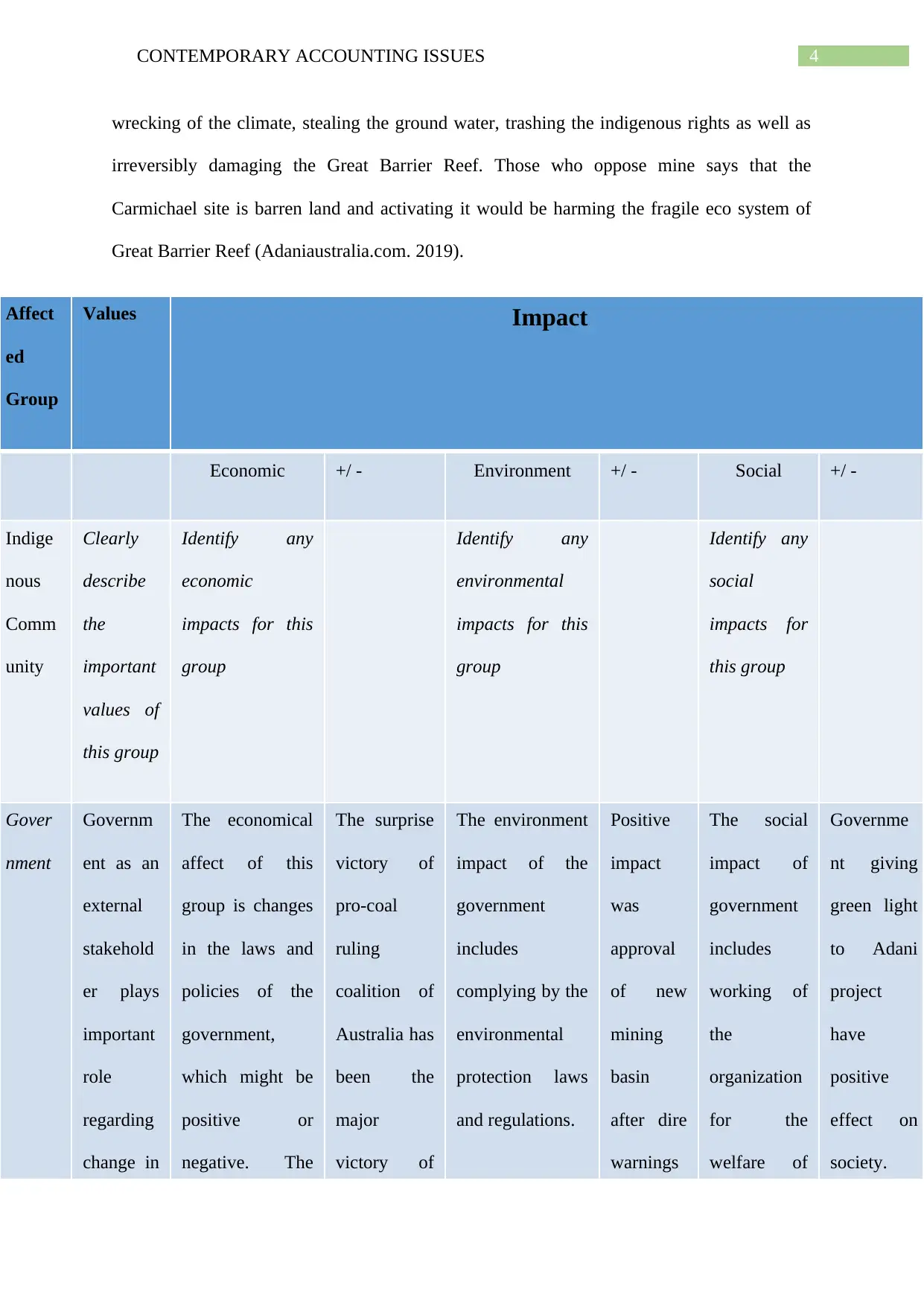
4CONTEMPORARY ACCOUNTING ISSUES
wrecking of the climate, stealing the ground water, trashing the indigenous rights as well as
irreversibly damaging the Great Barrier Reef. Those who oppose mine says that the
Carmichael site is barren land and activating it would be harming the fragile eco system of
Great Barrier Reef (Adaniaustralia.com. 2019).
Affect
ed
Group
Values Impact
Economic +/ - Environment +/ - Social +/ -
Indige
nous
Comm
unity
Clearly
describe
the
important
values of
this group
Identify any
economic
impacts for this
group
Identify any
environmental
impacts for this
group
Identify any
social
impacts for
this group
Gover
nment
Governm
ent as an
external
stakehold
er plays
important
role
regarding
change in
The economical
affect of this
group is changes
in the laws and
policies of the
government,
which might be
positive or
negative. The
The surprise
victory of
pro-coal
ruling
coalition of
Australia has
been the
major
victory of
The environment
impact of the
government
includes
complying by the
environmental
protection laws
and regulations.
Positive
impact
was
approval
of new
mining
basin
after dire
warnings
The social
impact of
government
includes
working of
the
organization
for the
welfare of
Governme
nt giving
green light
to Adani
project
have
positive
effect on
society.
wrecking of the climate, stealing the ground water, trashing the indigenous rights as well as
irreversibly damaging the Great Barrier Reef. Those who oppose mine says that the
Carmichael site is barren land and activating it would be harming the fragile eco system of
Great Barrier Reef (Adaniaustralia.com. 2019).
Affect
ed
Group
Values Impact
Economic +/ - Environment +/ - Social +/ -
Indige
nous
Comm
unity
Clearly
describe
the
important
values of
this group
Identify any
economic
impacts for this
group
Identify any
environmental
impacts for this
group
Identify any
social
impacts for
this group
Gover
nment
Governm
ent as an
external
stakehold
er plays
important
role
regarding
change in
The economical
affect of this
group is changes
in the laws and
policies of the
government,
which might be
positive or
negative. The
The surprise
victory of
pro-coal
ruling
coalition of
Australia has
been the
major
victory of
The environment
impact of the
government
includes
complying by the
environmental
protection laws
and regulations.
Positive
impact
was
approval
of new
mining
basin
after dire
warnings
The social
impact of
government
includes
working of
the
organization
for the
welfare of
Governme
nt giving
green light
to Adani
project
have
positive
effect on
society.
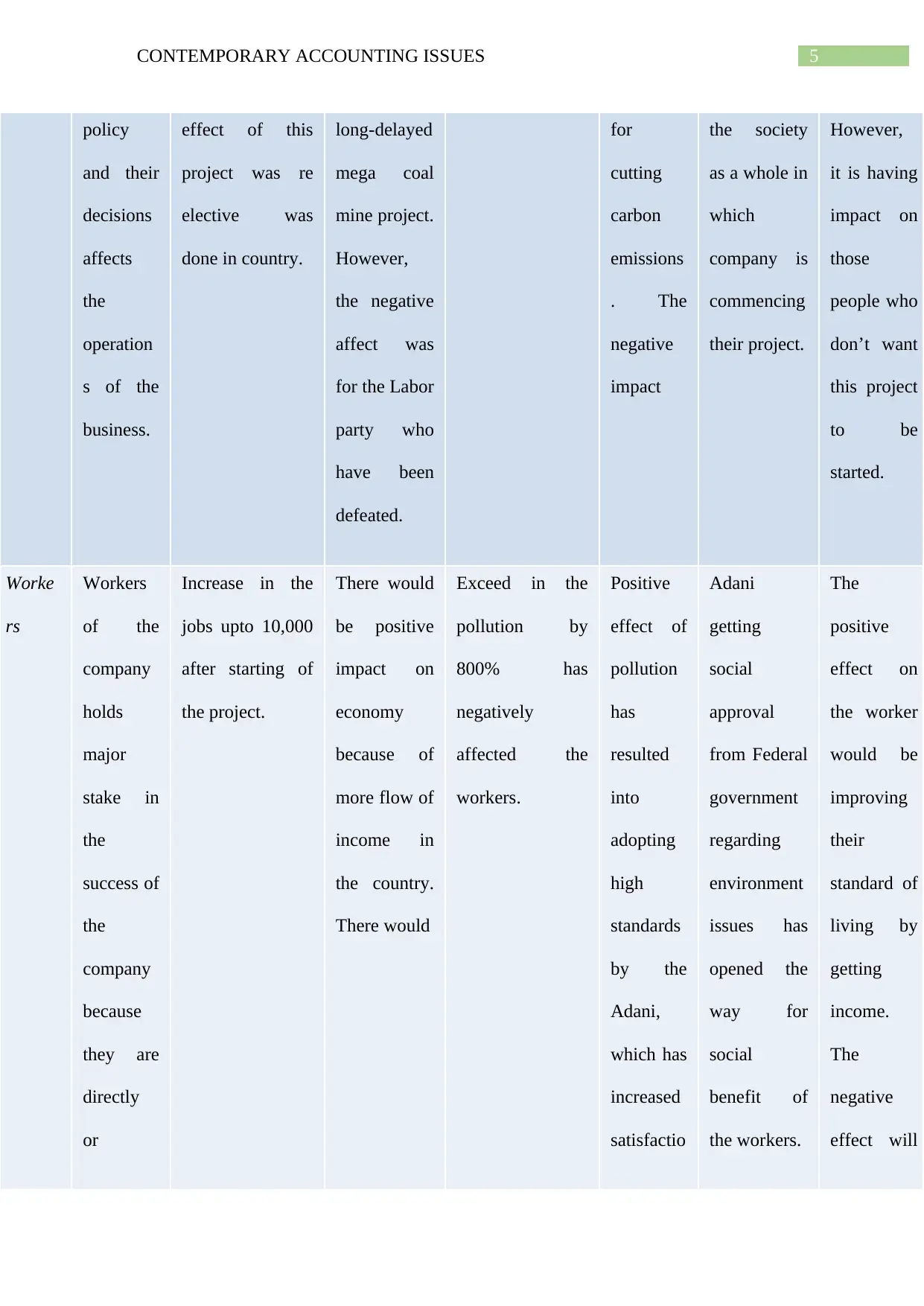
5CONTEMPORARY ACCOUNTING ISSUES
policy
and their
decisions
affects
the
operation
s of the
business.
effect of this
project was re
elective was
done in country.
long-delayed
mega coal
mine project.
However,
the negative
affect was
for the Labor
party who
have been
defeated.
for
cutting
carbon
emissions
. The
negative
impact
the society
as a whole in
which
company is
commencing
their project.
However,
it is having
impact on
those
people who
don’t want
this project
to be
started.
Worke
rs
Workers
of the
company
holds
major
stake in
the
success of
the
company
because
they are
directly
or
Increase in the
jobs upto 10,000
after starting of
the project.
There would
be positive
impact on
economy
because of
more flow of
income in
the country.
There would
Exceed in the
pollution by
800% has
negatively
affected the
workers.
Positive
effect of
pollution
has
resulted
into
adopting
high
standards
by the
Adani,
which has
increased
satisfactio
Adani
getting
social
approval
from Federal
government
regarding
environment
issues has
opened the
way for
social
benefit of
the workers.
The
positive
effect on
the worker
would be
improving
their
standard of
living by
getting
income.
The
negative
effect will
policy
and their
decisions
affects
the
operation
s of the
business.
effect of this
project was re
elective was
done in country.
long-delayed
mega coal
mine project.
However,
the negative
affect was
for the Labor
party who
have been
defeated.
for
cutting
carbon
emissions
. The
negative
impact
the society
as a whole in
which
company is
commencing
their project.
However,
it is having
impact on
those
people who
don’t want
this project
to be
started.
Worke
rs
Workers
of the
company
holds
major
stake in
the
success of
the
company
because
they are
directly
or
Increase in the
jobs upto 10,000
after starting of
the project.
There would
be positive
impact on
economy
because of
more flow of
income in
the country.
There would
Exceed in the
pollution by
800% has
negatively
affected the
workers.
Positive
effect of
pollution
has
resulted
into
adopting
high
standards
by the
Adani,
which has
increased
satisfactio
Adani
getting
social
approval
from Federal
government
regarding
environment
issues has
opened the
way for
social
benefit of
the workers.
The
positive
effect on
the worker
would be
improving
their
standard of
living by
getting
income.
The
negative
effect will
⊘ This is a preview!⊘
Do you want full access?
Subscribe today to unlock all pages.

Trusted by 1+ million students worldwide
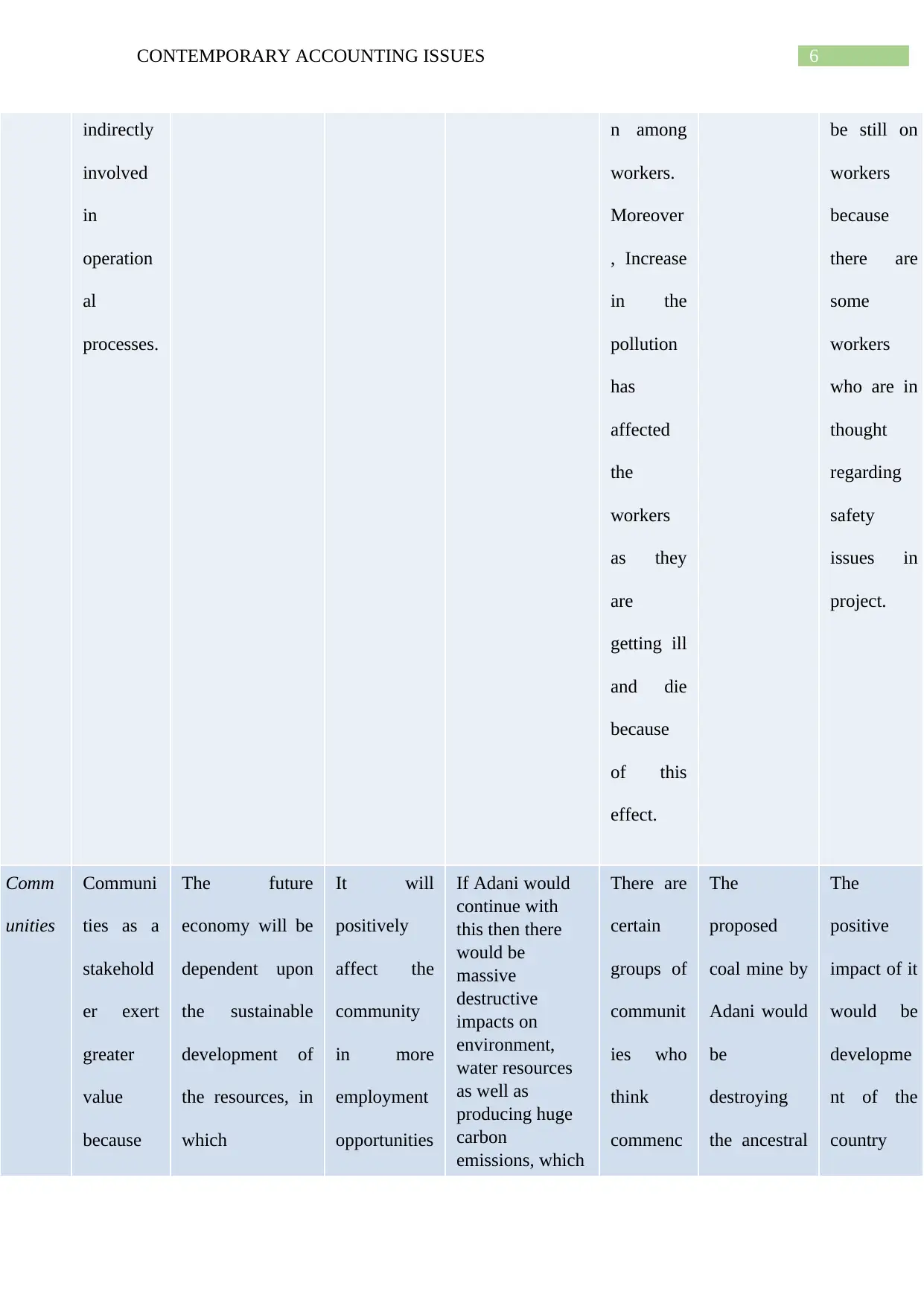
6CONTEMPORARY ACCOUNTING ISSUES
indirectly
involved
in
operation
al
processes.
n among
workers.
Moreover
, Increase
in the
pollution
has
affected
the
workers
as they
are
getting ill
and die
because
of this
effect.
be still on
workers
because
there are
some
workers
who are in
thought
regarding
safety
issues in
project.
Comm
unities
Communi
ties as a
stakehold
er exert
greater
value
because
The future
economy will be
dependent upon
the sustainable
development of
the resources, in
which
It will
positively
affect the
community
in more
employment
opportunities
If Adani would
continue with
this then there
would be
massive
destructive
impacts on
environment,
water resources
as well as
producing huge
carbon
emissions, which
There are
certain
groups of
communit
ies who
think
commenc
The
proposed
coal mine by
Adani would
be
destroying
the ancestral
The
positive
impact of it
would be
developme
nt of the
country
indirectly
involved
in
operation
al
processes.
n among
workers.
Moreover
, Increase
in the
pollution
has
affected
the
workers
as they
are
getting ill
and die
because
of this
effect.
be still on
workers
because
there are
some
workers
who are in
thought
regarding
safety
issues in
project.
Comm
unities
Communi
ties as a
stakehold
er exert
greater
value
because
The future
economy will be
dependent upon
the sustainable
development of
the resources, in
which
It will
positively
affect the
community
in more
employment
opportunities
If Adani would
continue with
this then there
would be
massive
destructive
impacts on
environment,
water resources
as well as
producing huge
carbon
emissions, which
There are
certain
groups of
communit
ies who
think
commenc
The
proposed
coal mine by
Adani would
be
destroying
the ancestral
The
positive
impact of it
would be
developme
nt of the
country
Paraphrase This Document
Need a fresh take? Get an instant paraphrase of this document with our AI Paraphraser
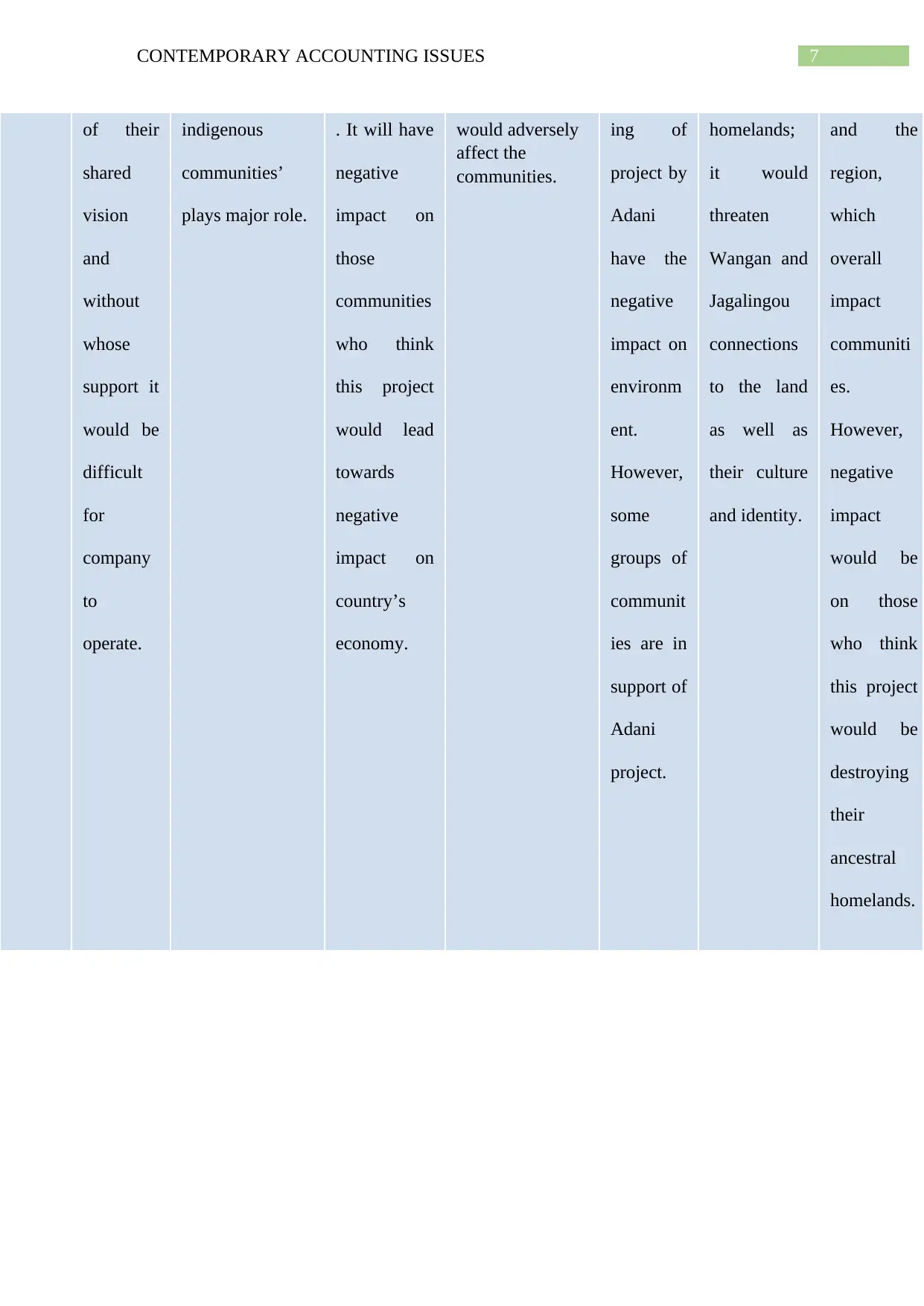
7CONTEMPORARY ACCOUNTING ISSUES
of their
shared
vision
and
without
whose
support it
would be
difficult
for
company
to
operate.
indigenous
communities’
plays major role.
. It will have
negative
impact on
those
communities
who think
this project
would lead
towards
negative
impact on
country’s
economy.
would adversely
affect the
communities.
ing of
project by
Adani
have the
negative
impact on
environm
ent.
However,
some
groups of
communit
ies are in
support of
Adani
project.
homelands;
it would
threaten
Wangan and
Jagalingou
connections
to the land
as well as
their culture
and identity.
and the
region,
which
overall
impact
communiti
es.
However,
negative
impact
would be
on those
who think
this project
would be
destroying
their
ancestral
homelands.
of their
shared
vision
and
without
whose
support it
would be
difficult
for
company
to
operate.
indigenous
communities’
plays major role.
. It will have
negative
impact on
those
communities
who think
this project
would lead
towards
negative
impact on
country’s
economy.
would adversely
affect the
communities.
ing of
project by
Adani
have the
negative
impact on
environm
ent.
However,
some
groups of
communit
ies are in
support of
Adani
project.
homelands;
it would
threaten
Wangan and
Jagalingou
connections
to the land
as well as
their culture
and identity.
and the
region,
which
overall
impact
communiti
es.
However,
negative
impact
would be
on those
who think
this project
would be
destroying
their
ancestral
homelands.
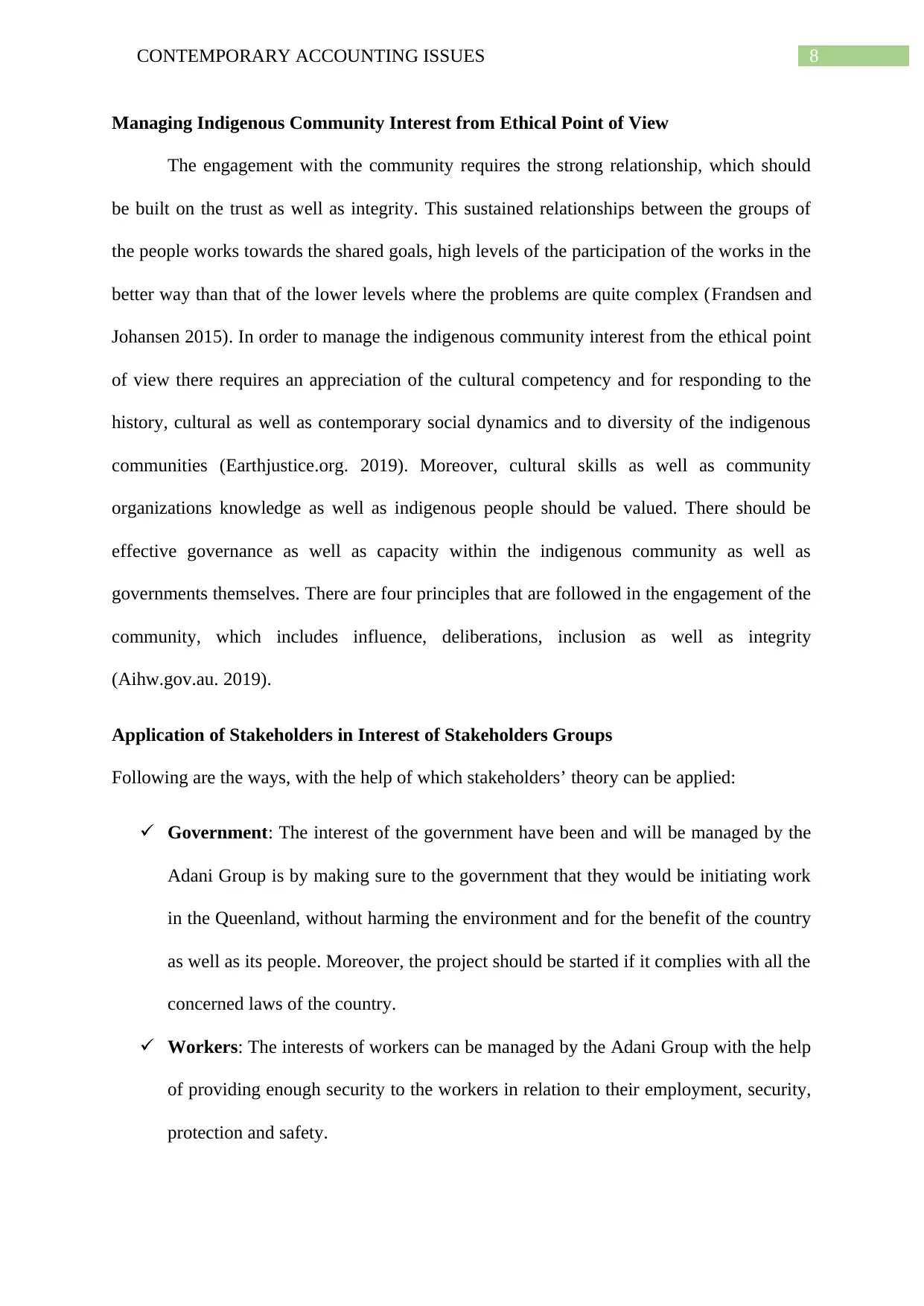
8CONTEMPORARY ACCOUNTING ISSUES
Managing Indigenous Community Interest from Ethical Point of View
The engagement with the community requires the strong relationship, which should
be built on the trust as well as integrity. This sustained relationships between the groups of
the people works towards the shared goals, high levels of the participation of the works in the
better way than that of the lower levels where the problems are quite complex (Frandsen and
Johansen 2015). In order to manage the indigenous community interest from the ethical point
of view there requires an appreciation of the cultural competency and for responding to the
history, cultural as well as contemporary social dynamics and to diversity of the indigenous
communities (Earthjustice.org. 2019). Moreover, cultural skills as well as community
organizations knowledge as well as indigenous people should be valued. There should be
effective governance as well as capacity within the indigenous community as well as
governments themselves. There are four principles that are followed in the engagement of the
community, which includes influence, deliberations, inclusion as well as integrity
(Aihw.gov.au. 2019).
Application of Stakeholders in Interest of Stakeholders Groups
Following are the ways, with the help of which stakeholders’ theory can be applied:
Government: The interest of the government have been and will be managed by the
Adani Group is by making sure to the government that they would be initiating work
in the Queenland, without harming the environment and for the benefit of the country
as well as its people. Moreover, the project should be started if it complies with all the
concerned laws of the country.
Workers: The interests of workers can be managed by the Adani Group with the help
of providing enough security to the workers in relation to their employment, security,
protection and safety.
Managing Indigenous Community Interest from Ethical Point of View
The engagement with the community requires the strong relationship, which should
be built on the trust as well as integrity. This sustained relationships between the groups of
the people works towards the shared goals, high levels of the participation of the works in the
better way than that of the lower levels where the problems are quite complex (Frandsen and
Johansen 2015). In order to manage the indigenous community interest from the ethical point
of view there requires an appreciation of the cultural competency and for responding to the
history, cultural as well as contemporary social dynamics and to diversity of the indigenous
communities (Earthjustice.org. 2019). Moreover, cultural skills as well as community
organizations knowledge as well as indigenous people should be valued. There should be
effective governance as well as capacity within the indigenous community as well as
governments themselves. There are four principles that are followed in the engagement of the
community, which includes influence, deliberations, inclusion as well as integrity
(Aihw.gov.au. 2019).
Application of Stakeholders in Interest of Stakeholders Groups
Following are the ways, with the help of which stakeholders’ theory can be applied:
Government: The interest of the government have been and will be managed by the
Adani Group is by making sure to the government that they would be initiating work
in the Queenland, without harming the environment and for the benefit of the country
as well as its people. Moreover, the project should be started if it complies with all the
concerned laws of the country.
Workers: The interests of workers can be managed by the Adani Group with the help
of providing enough security to the workers in relation to their employment, security,
protection and safety.
⊘ This is a preview!⊘
Do you want full access?
Subscribe today to unlock all pages.

Trusted by 1+ million students worldwide
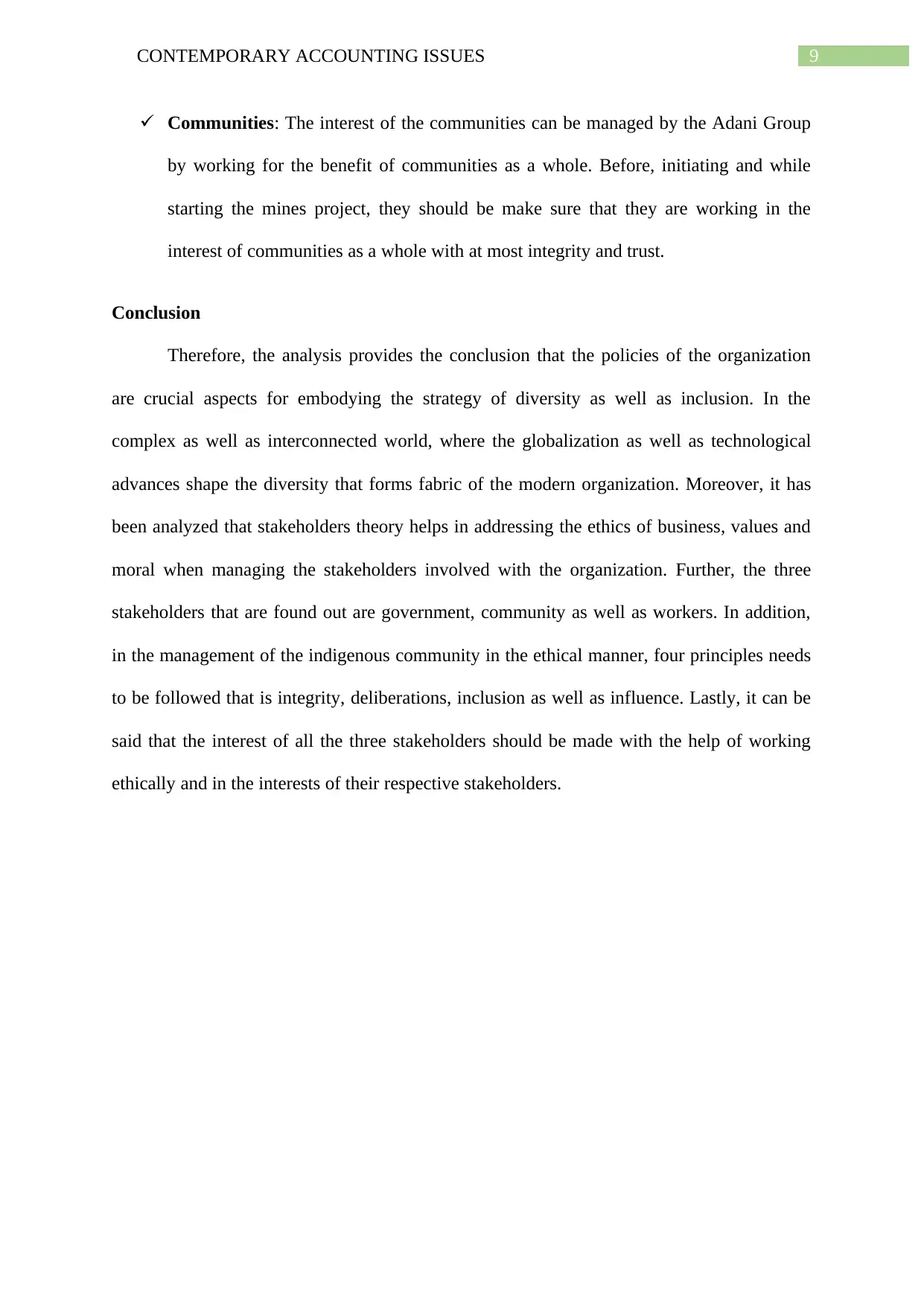
9CONTEMPORARY ACCOUNTING ISSUES
Communities: The interest of the communities can be managed by the Adani Group
by working for the benefit of communities as a whole. Before, initiating and while
starting the mines project, they should be make sure that they are working in the
interest of communities as a whole with at most integrity and trust.
Conclusion
Therefore, the analysis provides the conclusion that the policies of the organization
are crucial aspects for embodying the strategy of diversity as well as inclusion. In the
complex as well as interconnected world, where the globalization as well as technological
advances shape the diversity that forms fabric of the modern organization. Moreover, it has
been analyzed that stakeholders theory helps in addressing the ethics of business, values and
moral when managing the stakeholders involved with the organization. Further, the three
stakeholders that are found out are government, community as well as workers. In addition,
in the management of the indigenous community in the ethical manner, four principles needs
to be followed that is integrity, deliberations, inclusion as well as influence. Lastly, it can be
said that the interest of all the three stakeholders should be made with the help of working
ethically and in the interests of their respective stakeholders.
Communities: The interest of the communities can be managed by the Adani Group
by working for the benefit of communities as a whole. Before, initiating and while
starting the mines project, they should be make sure that they are working in the
interest of communities as a whole with at most integrity and trust.
Conclusion
Therefore, the analysis provides the conclusion that the policies of the organization
are crucial aspects for embodying the strategy of diversity as well as inclusion. In the
complex as well as interconnected world, where the globalization as well as technological
advances shape the diversity that forms fabric of the modern organization. Moreover, it has
been analyzed that stakeholders theory helps in addressing the ethics of business, values and
moral when managing the stakeholders involved with the organization. Further, the three
stakeholders that are found out are government, community as well as workers. In addition,
in the management of the indigenous community in the ethical manner, four principles needs
to be followed that is integrity, deliberations, inclusion as well as influence. Lastly, it can be
said that the interest of all the three stakeholders should be made with the help of working
ethically and in the interests of their respective stakeholders.
Paraphrase This Document
Need a fresh take? Get an instant paraphrase of this document with our AI Paraphraser
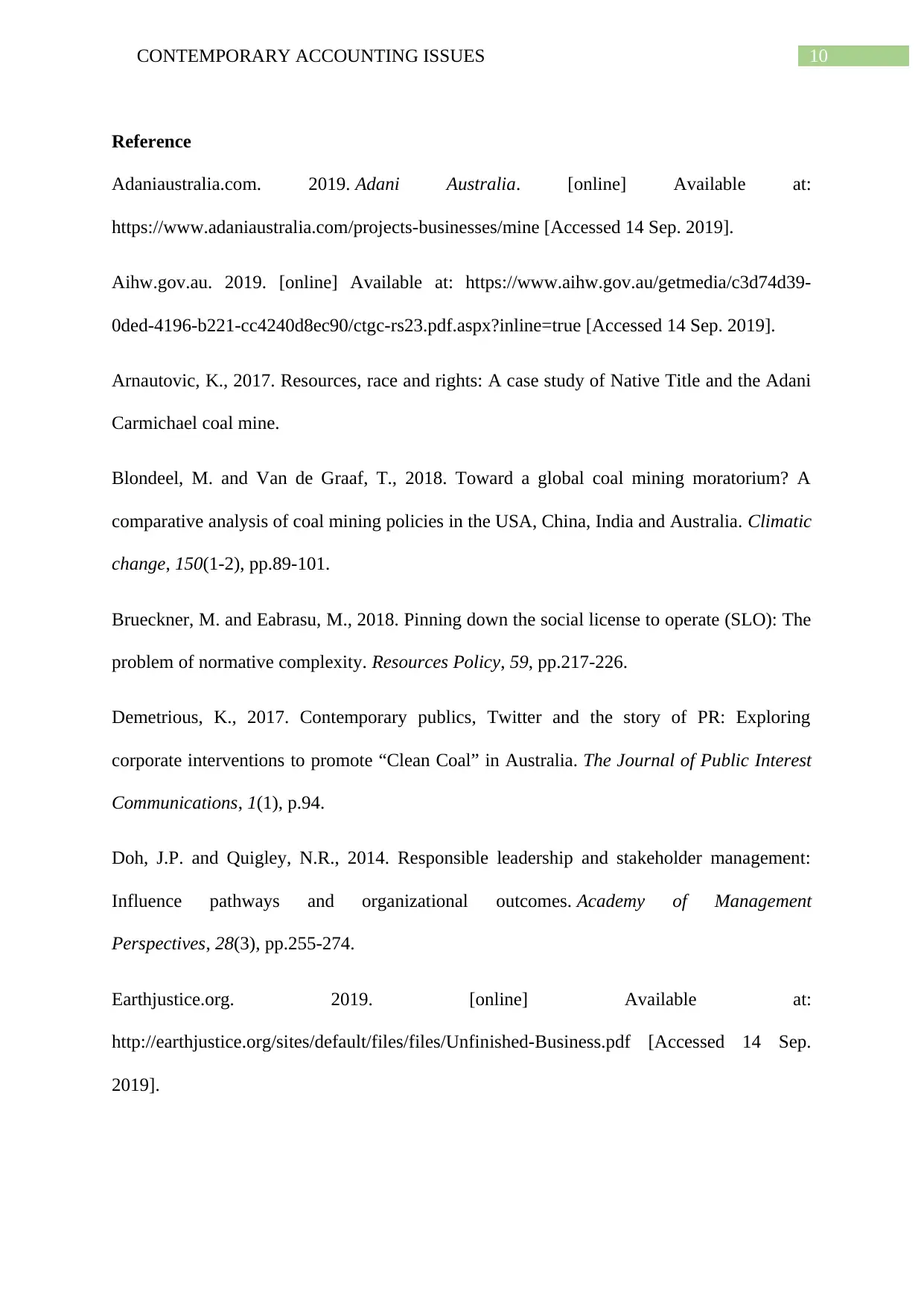
10CONTEMPORARY ACCOUNTING ISSUES
Reference
Adaniaustralia.com. 2019. Adani Australia. [online] Available at:
https://www.adaniaustralia.com/projects-businesses/mine [Accessed 14 Sep. 2019].
Aihw.gov.au. 2019. [online] Available at: https://www.aihw.gov.au/getmedia/c3d74d39-
0ded-4196-b221-cc4240d8ec90/ctgc-rs23.pdf.aspx?inline=true [Accessed 14 Sep. 2019].
Arnautovic, K., 2017. Resources, race and rights: A case study of Native Title and the Adani
Carmichael coal mine.
Blondeel, M. and Van de Graaf, T., 2018. Toward a global coal mining moratorium? A
comparative analysis of coal mining policies in the USA, China, India and Australia. Climatic
change, 150(1-2), pp.89-101.
Brueckner, M. and Eabrasu, M., 2018. Pinning down the social license to operate (SLO): The
problem of normative complexity. Resources Policy, 59, pp.217-226.
Demetrious, K., 2017. Contemporary publics, Twitter and the story of PR: Exploring
corporate interventions to promote “Clean Coal” in Australia. The Journal of Public Interest
Communications, 1(1), p.94.
Doh, J.P. and Quigley, N.R., 2014. Responsible leadership and stakeholder management:
Influence pathways and organizational outcomes. Academy of Management
Perspectives, 28(3), pp.255-274.
Earthjustice.org. 2019. [online] Available at:
http://earthjustice.org/sites/default/files/files/Unfinished-Business.pdf [Accessed 14 Sep.
2019].
Reference
Adaniaustralia.com. 2019. Adani Australia. [online] Available at:
https://www.adaniaustralia.com/projects-businesses/mine [Accessed 14 Sep. 2019].
Aihw.gov.au. 2019. [online] Available at: https://www.aihw.gov.au/getmedia/c3d74d39-
0ded-4196-b221-cc4240d8ec90/ctgc-rs23.pdf.aspx?inline=true [Accessed 14 Sep. 2019].
Arnautovic, K., 2017. Resources, race and rights: A case study of Native Title and the Adani
Carmichael coal mine.
Blondeel, M. and Van de Graaf, T., 2018. Toward a global coal mining moratorium? A
comparative analysis of coal mining policies in the USA, China, India and Australia. Climatic
change, 150(1-2), pp.89-101.
Brueckner, M. and Eabrasu, M., 2018. Pinning down the social license to operate (SLO): The
problem of normative complexity. Resources Policy, 59, pp.217-226.
Demetrious, K., 2017. Contemporary publics, Twitter and the story of PR: Exploring
corporate interventions to promote “Clean Coal” in Australia. The Journal of Public Interest
Communications, 1(1), p.94.
Doh, J.P. and Quigley, N.R., 2014. Responsible leadership and stakeholder management:
Influence pathways and organizational outcomes. Academy of Management
Perspectives, 28(3), pp.255-274.
Earthjustice.org. 2019. [online] Available at:
http://earthjustice.org/sites/default/files/files/Unfinished-Business.pdf [Accessed 14 Sep.
2019].
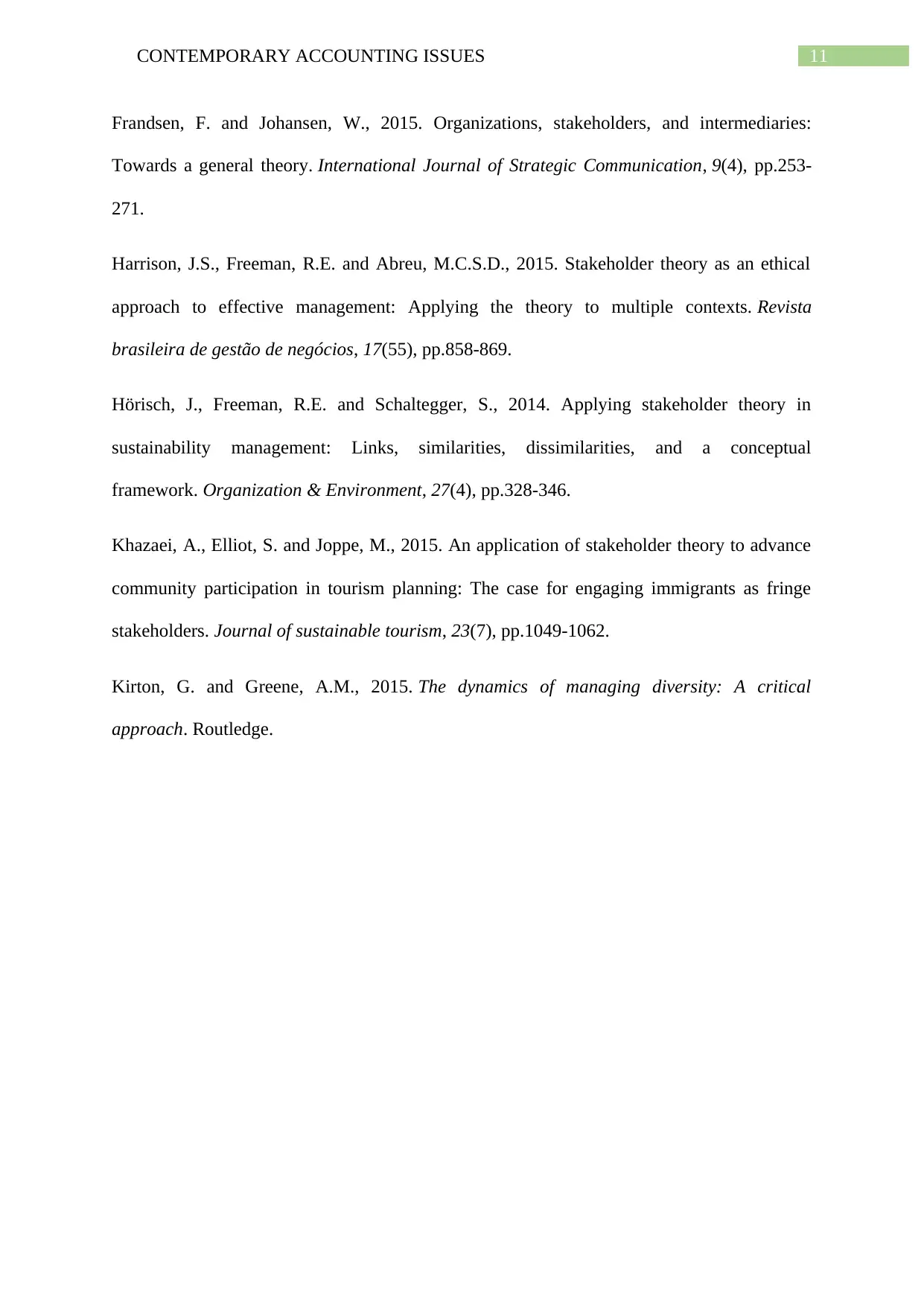
11CONTEMPORARY ACCOUNTING ISSUES
Frandsen, F. and Johansen, W., 2015. Organizations, stakeholders, and intermediaries:
Towards a general theory. International Journal of Strategic Communication, 9(4), pp.253-
271.
Harrison, J.S., Freeman, R.E. and Abreu, M.C.S.D., 2015. Stakeholder theory as an ethical
approach to effective management: Applying the theory to multiple contexts. Revista
brasileira de gestão de negócios, 17(55), pp.858-869.
Hörisch, J., Freeman, R.E. and Schaltegger, S., 2014. Applying stakeholder theory in
sustainability management: Links, similarities, dissimilarities, and a conceptual
framework. Organization & Environment, 27(4), pp.328-346.
Khazaei, A., Elliot, S. and Joppe, M., 2015. An application of stakeholder theory to advance
community participation in tourism planning: The case for engaging immigrants as fringe
stakeholders. Journal of sustainable tourism, 23(7), pp.1049-1062.
Kirton, G. and Greene, A.M., 2015. The dynamics of managing diversity: A critical
approach. Routledge.
Frandsen, F. and Johansen, W., 2015. Organizations, stakeholders, and intermediaries:
Towards a general theory. International Journal of Strategic Communication, 9(4), pp.253-
271.
Harrison, J.S., Freeman, R.E. and Abreu, M.C.S.D., 2015. Stakeholder theory as an ethical
approach to effective management: Applying the theory to multiple contexts. Revista
brasileira de gestão de negócios, 17(55), pp.858-869.
Hörisch, J., Freeman, R.E. and Schaltegger, S., 2014. Applying stakeholder theory in
sustainability management: Links, similarities, dissimilarities, and a conceptual
framework. Organization & Environment, 27(4), pp.328-346.
Khazaei, A., Elliot, S. and Joppe, M., 2015. An application of stakeholder theory to advance
community participation in tourism planning: The case for engaging immigrants as fringe
stakeholders. Journal of sustainable tourism, 23(7), pp.1049-1062.
Kirton, G. and Greene, A.M., 2015. The dynamics of managing diversity: A critical
approach. Routledge.
⊘ This is a preview!⊘
Do you want full access?
Subscribe today to unlock all pages.

Trusted by 1+ million students worldwide
1 out of 12
Related Documents
Your All-in-One AI-Powered Toolkit for Academic Success.
+13062052269
info@desklib.com
Available 24*7 on WhatsApp / Email
![[object Object]](/_next/static/media/star-bottom.7253800d.svg)
Unlock your academic potential
Copyright © 2020–2026 A2Z Services. All Rights Reserved. Developed and managed by ZUCOL.





